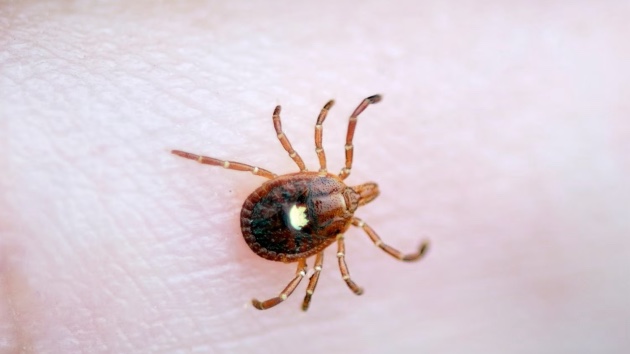Texas abortion law means woman has to continue pregnancy despite fatal anomaly
Written by ABC Audio ALL RIGHTS RESERVED on March 20, 2023

(NEW YORK) — Kylie Beaton was looking forward to having her second child later this year. Now, she’s faced with carrying an unviable pregnancy to its end due to Texas’ highly restrictive abortion ban.
According to a report from her doctor, Beaton’s baby has a rare, severe condition impacting the development of its brain, but she is unable to access abortion care in her home state.
“To have a woman go through so much torture along the way that’s going to stay with them forever,” Beaton told ABC News. “Whatever the case may be, you have to look at things from a different perspective.”
Texas has several abortion bans in place that prohibit nearly all abortions, except when a mother’s life is at risk or there is a risk of serious bodily harm. The state has civil and criminal penalties for performing banned abortions.
Beaton, who has a 4-year-old daughter with her husband, Seth, said the couple had been actively trying to get pregnant when they conceived the unviable pregnancy. Seth had been hospitalized with COVID pneumonia in June 2021. When he was finally released six months later, the couple started trying to have a baby right away, Beaton said. Beaton has polycystic ovary syndrome, which can make it harder for women to get pregnant, so it was all the more joyful when she learned their efforts were successful.
“I was really excited when we found that it was a boy, but that was short-lived,” Seth Beaton told ABC News. “Right now, I’m just terrified for my wife. She’s the strongest person I know and she’s just helpless right now. And it’s not fair for her and other women. And we have a daughter, I couldn’t imagine my daughter ever having to go through this.”
At her 20-week ultrasound appointment, Beaton said her physician discovered the fetus had a rare, severe anomaly — called alobar holoprosencephaly — in which the fetus’s brain does not develop into two hemispheres as it normally would, and the major structures of the brain remain fused in the middle.
The brain splitting into two hemispheres is a “critical stage in the development” and can impact the development of the nose, mouth and throat, Dr. Katie McHugh, an Indiana OB-GYN and abortion provider, told ABC News. The condition results in a very painful life and death for the fetus, McHugh said.
“Often times we will offer, if not recommend, pregnancy termination,” McHugh said.
The anomaly occurs in about 1 in 250 fetuses, but in just 1 in 16,000 live births, according to the Cleveland Clinic. In her seven years practicing as a maternal fetal medicine specialist, Dr. Carrie Rouse, an OB-GYN and maternal fetal medicine specialist at Indiana University Health, said she has only come across five cases. Beaton’s 28-week ultrasound shows the severity of her baby’s anomaly.
“The inside appears very empty,” said Rouse, who is not treating Beaton, but looked at her ultrasound. “The normal brain structures that we would see, that should have formed and then separated in the midline, are not there where they normally would be. This is a very concerning ultrasound.”
Beaton said her physicians told her the baby could survive out of the womb for a couple of weeks, at most, in the event that the pregnancy ends in a live birth. Rouse agreed with this assessment, pointing to what she said is a lack of development of normal brain tissue and empty fluid filling the head.
“This anomaly is typically lethal for most infants within days to weeks,” Rouse said. “Outliers are only able to survive with significant amount of invasive procedures and interventions.”
Babies with this condition never reach developmental milestones, meaning they won’t have any intentional interactions like smiling, and often can’t see, have severe seizures and hormonal abnormalities, according to Rouse. Very few outliers are able to survive up to a year and the level of intervention needed for babies with this condition to survive is extremely high; they often need mechanical ventilation or a life support machine, multiple medications and repeated lab draws, Rouse said.
“They live to a year with basically heroic measures,” Rouse said.
Beaton said her physician referred her to a specialist a week after her diagnosis. However, she said the specialist confirmed that due to the overturning of Roe v. Wade, and Texas’ “trigger” law effectively outlawing nearly all abortions, the physicians’ hands were tied. She said the specialist told her he could not do anything to end the pregnancy unless Beaton developed a severe health issue or if the fetus dies in the womb.
Anti-abortion group Texas Right to Life has routinely argued that fetuses should be “honored and protected in law no matter how long or short their lives may be,” according to a statement earlier this month.
Representatives for Texas Gov. Greg Abbott, Attorney General Ken Paxton and state Sen. Bryan Hughes, who authored one of the state’s abortion bans, did not immediately respond to ABC News’ request for comment about Beaton’s situation.
Beaton said she wanted to have a vaginal delivery, feeling like a scar from a cesarean section would be a constant reminder of what she had lost. A C-section also means that the couple would be advised to wait 12 to 18 months before trying to get pregnant again, the typical time physicians recommend women wait so their uterus can recover from surgery, according to the Center for Advanced Reproductive Medicine and Fertility.
“With this condition, in particular, because the head, the fetal head, develops at a different rate, often because of fluid collections, most of the time vaginal delivery is not an option. And so cesarean delivery is required,” McHugh said. “And this is going to be major abdominal surgery, with risks associated with it — for a baby that has maybe no chance of a normal life or potentially of survival at all, depending on the severity.”
Unable to get care in Texas, Beaton said she booked an appointment to get an abortion at a clinic in New Mexico in February.
But, she said when she went in for an ultrasound days before her appointment, she was told her baby’s head had grown too big and she could no longer get the procedure. The facility’s cutoff for abortions is 23 weeks and six days she said and the fetus’s head was already measuring at what it typically would at over 23 weeks of pregnancy.
“From there, we were pretty let down,” Kylie Beaton said.
She said she was referred to a clinic in Colorado that provides later-term abortion care, but that facility told them it would cost between $10,000 to $15,000 for the procedure, which was financially out of question, Beaton said. The New Mexico clinic would have provided the same procedure for $3,500, Kylie Beaton said. Neither estimate includes the cost of travel and accommodation.
Since then, the fetus’s head has continually increased in size, filling with fluid, she said. At her appointment on Monday, when she was 28 weeks pregnant, the fetus’s head size was measuring at what it typically would be at 39 weeks, a full-term pregnancy, the ultrasound showed.
“On that ultrasound, the head is measuring significantly larger than it should be. It’s measuring about 10 weeks further along than she actually is, which is very concerning,” Rouse, the Indiana Health System OB-GYN, said.
Rouse said Beaton’s C-section could be more complicated and risky as her pregnancy continues.
“You worry about ongoing growth of the fetal head of causing more complications at the time of delivery, like hemorrhage, needing a blood transfusion, needing to use a larger incision on her abdomen in order to to remove the infant, needing to use a larger and different incision on the uterus in order to remove the infant,” Rouse said. “There’s a risk of possibly uterine rupture just because of the stretch on the uterus. All of these things would make me pretty worried.”
“For a condition for which we expect the baby to pass away soon after birth, that baby is going to pass away because of the alobar holoprosencephaly, whether they are born at 39 weeks or earlier,” Rouse added.
Beaton said her physicians in Texas contacted other doctors in the state, hoping they had heard of an alternative regarding the state’s laws that would permit them to induce her labor since the baby’s head was at full term. Ultimately, Beaton said, doctors determined the size of the baby’s head was not a good enough reason to induce labor because her health is still not at risk.
“And if the state were to find out, they would most likely press charges,” Kylie Beaton said.
Texas’ anti-abortion law makes it a second-degree felony for any attempt by a medical professional to perform, induce or attempt an abortion, and a first-degree felony if the abortion is carried out.
“My specialist and my OB both had said I had to go essentially full term to at least 37 weeks unless something happens to either the baby or I, then they could induce,” Kylie Beaton said.
The couple said the law has left them feeling helpless and frustrated over not being able to make a humane decision for their baby.
“I mean, for them to say, ‘Well, you need to wait until you’re in a health crisis, a health issue to where your life’s in jeopardy, then that’s when we can take it.’ Well, then why do we have doctors?” Kylie Beaton said.
“Why are we taking medications for things like high blood pressure? Why don’t you wait until you have a heart attack? Or until you have, you know, the signs that you’re having a stroke to be on medication? All those things? It’s kind of the same way, if you look at it from our perspective,” she added.
Before this pregnancy, Beaton said she never would have considered getting an abortion. Now, she believes abortions should be allowed in cases like hers and for women with other health conditions to get the care they need.
“I’m personally not for it being a way of birth control. I do believe that there are certain instances where I deem that it is necessary,” she said. “Never in a million years would I expect or believe that we will be going through what we’re going through now.”
Copyright © 2023, ABC Audio. All rights reserved.
 KVSP
KVSP 




